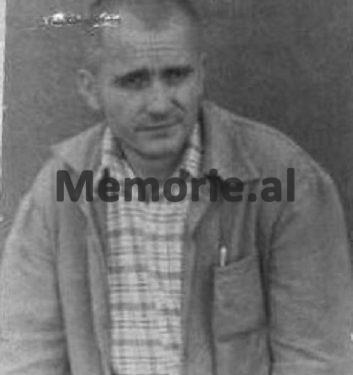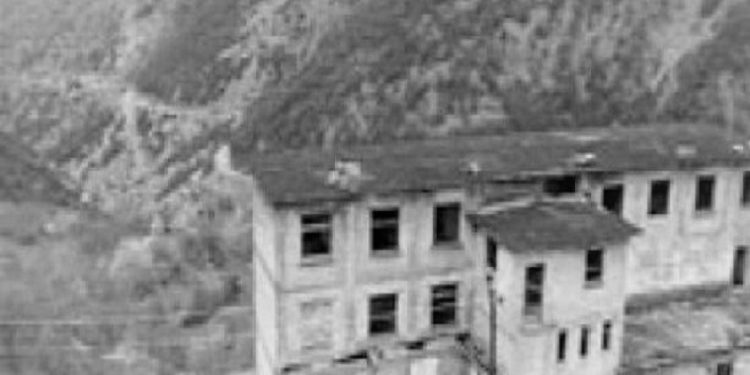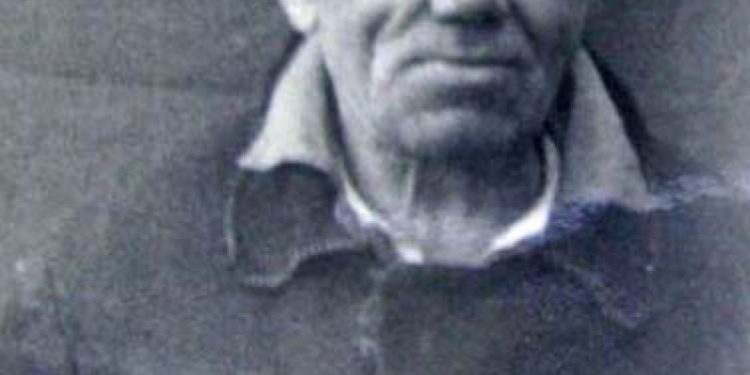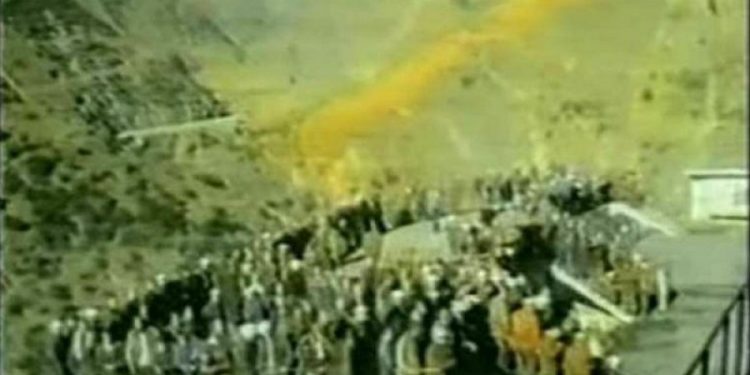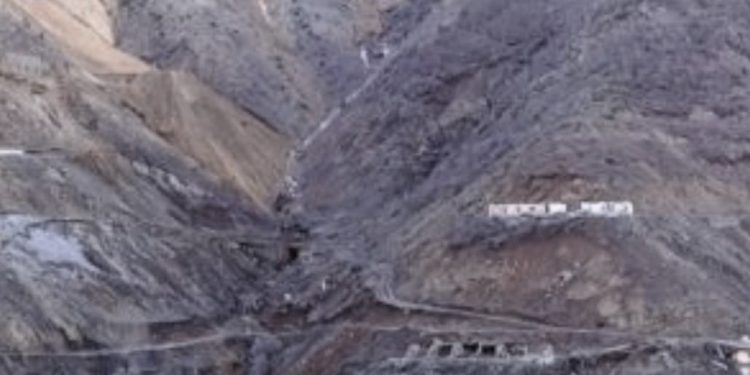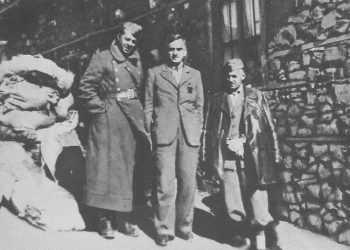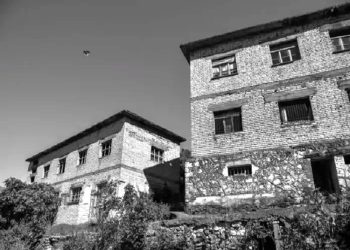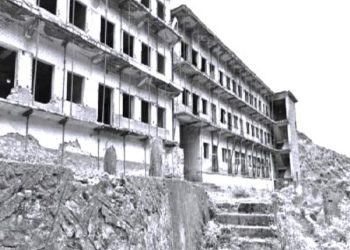By Gjet Kadeli
The nineteenth part
Memorie.al publishes some archival documents issued by the Authority for the Information of the Files of the former State Security, where there is a voluminous file (the processing form file with 433 pages and the investigative and judicial file with 632 pages) in charge of Gjet Kadel, originating from the village of Bulshar in Oroshi of Mirdita and living in Bushnesh and Mamurras of Kurbin, former political prisoner in the communist regime of Enver Hoxha and his successor, Ramiz Alia, who spent 16 years in communist camps and prisons, as in Spaç, Burrel, etc. As we will see from the documents that are in the file in charge of Gjet Kadel, which is published for the first time by Memorie.al, the surveillance and pursuit of him began in 1957, when he was 17 years old, with the information report of the State Security officer, Fahri Kraja, (based on the data of the Security associate with the nickname “Dylli i Bardhë”, with the approval of the Head of the Department of Internal Affairs of the Kruja district, lieutenant colonel Muhedin Këxhalliu) , continued even during the period he was in camps and prisons, such as in Spaç, where after the revolt of May 1973, Gjeta was sentenced again, as he was the main ideator for raising the flag without the communist star, continuing then in the prison of Burrel, with the reports-information of the Operative Worker, Piro Nuredini, etc., about Gjeta’s conversations with other convicts of that prison, such as: Pjetër Arbnori, Daut Gumeni, Abdulla Sallaku, Spartak Ngjela, Avni Aliko, Luan Burimi , Çaush Çoku, Kapllan Resuli, B come Gjonzeneli, Bashkim Shehu, etc. The surveillance and follow-up of Gjet Kadel continued even after his release from prison in 1987, continuing until January 1991, with the collapse of the communist regime, when his file was finally closed and archived in the secret archive of the former State Security. In the same way, an important place in the said files is also occupied by letter correspondence of Gjeta and his family, with their father, Pjetër Kadeli, former soldier of the Monarchy of Zogu, who had blown up the prison cells of Internal Branch of Rrëshen on July 28, 1950, stayed for some time in the mountains on the run, and then in 1951, secretly returned to Mirdita, took his son, Gjoni, and escaped to Yugoslavia and then to the USA- es, where he stayed as a political emigrant, until the beginning of the 90s, when he returned permanently to Albania. During this period of almost 35 years since Gjet Kadeli has been followed and monitored by the State Security, a total of 33 associates of the State Security have been engaged and activated against him, who have given their reports, starting from “White Wax” in 1957, until the “Mountain Swallow” in 1990, which will be reflected in full, as they are in the relevant files.
Continues from last issue
The document with the decision of the district court of Mirdita, for the convicts of the Spaçi prison camp, who organized and participated in the revolt of May 22, 1973, where Gjet Kadeli appears first on the list
THE PEOPLE’S REPUBLIC OF ALBANIA
DISTRICT PEOPLE’S COURT No. 39 of the Decision
MIRDITA Date 25.7.1973
No. 39 of Reg. Basic.
DECISION
“IN THE NAME OF THE PEOPLE”
The People’s Court of the Mirdita district consisting of:
To the chairman of the court session, Filip Lako
Assistant to the judge Pjeter Nikolli
Assistant to the judge Nikoll Gjoni
Assisted by the secretary Sadik Mema, with the participation of the district prosecutor Zef Deda, on July 23, 24 and 25, 1973, considered in an open court session the criminal case No. 39 belonging to the defendants:
- GJET KADELI, the son of Pjetri and Mrika, born in Bulshar village of Mirdita and resident of Mamurras, born June 7, 1942, of social origin poor peasant, working class, carpenter by profession, with 7 years of education, married with 5 children, no party, sentenced by the Krujë district court, with 10 years of imprisonment, with decision No. 90 dated 24.11.1972 based on articles 73/I and 273/II of the Penal Code. He served his sentence in the re-education camp No. 303 in Spaç.
- NAPOLON KALECI, son of Muntaz and Sheniko, born on 20.1.1938 in Starje, Kolonje, resident there, with social origin middle peasant, social status worker, profession mason, unmarried, no party, educated high school, sentenced by the Korçë District Court, with decision No. 4 dated 21.1.1966, to 14 years of imprisonment, confiscation of property and loss of electoral right for 3 years, based on articles 64, 10, 14, 73 /1 of the Penal Code: Served the sentence in the re-education camp No. 303 Spac.
- XHEMAL BALI, son of Madan and Hatixa, born on 20.3.1936 in Vervë village of Konispoli, resident there, of poor peasant origin, working class, with secondary education, no party, married with 2 children, sentenced to 17 years of imprisonment and loss of electoral right for 3 years, confiscation of property based on Article 64, 10 and 13 of the Penal Code, with decision No. 41 dated 8.7.1961, of the Military Court of Gjirokastra and while serving his sentence, he was sentenced to another 10 years of imprisonment, based on Article 73/1 of the Penal Code, with the application of Article 49 of the Penal Code, sentenced to 17 years of imprisonment by the district court of Elbasan, with decision No. 18 dated 27.10.1967, serving his sentence in re-education camp No. 303 Spaç.
- FERIT AVDULLARI, the son of Maliqi and Piko, born in 1925 in the village of Lin in Pogradec, resident there, with social origins, a poor peasant, working class, no party, primary education, unmarried, convicted 5 times ( once for robbery, 2 times for theft, 1 time for assaulting an official and the last time, sentenced to 6 years of imprisonment based on Article 73/1 of the Criminal Code with decision No. 39 dated 29.7.1971 in the district court Pogradec), serving his sentence in re-education camp No. 303 Spac.
- BARDHYL FEJZULLARI, son of Tajar and Barija, born on 20.9.1945 in Dushar village of Korça district and resident in Pogradec, of middle peasant origin, with working status, teaching profession, no party, unmarried, with education 2 middle class, sentenced to 10 years of imprisonment based on article 64/10 of the Criminal Code, with the decision No. 37 dated 29.12.1966, of the Korçë District Court, serving the sentence in the re-education camp No. 303 Spaç.
- SOTIRAQ SIMAKU, the son of Miti and Aspasija, born on 25.10.1946 in Dardhë village of Korça and resident in Boboshtica village of Korça, of social origin a poor peasant, with a working status, with a secondary agronomist profession, with a secondary education, without party, unmarried, sentenced to 10 years of imprisonment, confiscation of property and loss of electoral right for 2 years, based on article 64 and 10, 14 of the Criminal Code. by decision No. 16 dated 28.7.1966 of the Korçë District Court, he is serving his sentence in the re-education camp No. 303 Spac.
- HYSEN XHANI, son of Avdyl and Nurija, born in Tirana on 6.2.1955, resident there, of social origin, poor peasant, working class, painter by profession, 7 years of education, no party, unmarried, sentenced to 6 years of imprisonment based on Article 73/1 of the Criminal Code. With the decision No. 228 dated 12.11.1970 of the Tirana district court; he is serving his sentence in the re-education camp No. 303 Spaç.
All the defendants accused of having participated in an organization against the people’s power, carrying out sabotage and agitation and propaganda, which has brought particularly serious consequences, crimes that are foreseen by articles 27, 73/II in combination with article 76 of K.P.
The court, after reviewing the investigation materials, the evidence administered during the trial, after listening to the prosecutor, who requested the guilty declaration of the defendants: Gjet Kadeli, Napolon Kaleci, Xhemal Bali, Ferit Avdullari, Bardhyl Fejzullari, Sotir Simaku and Hysen Xhani and based on of Article 72 in combination with Article 76 of the Penal Code to punish:
- Gjet Kadeli was sentenced to 12 years of imprisonment, confiscation of property and loss of electoral rights for 5 years.
- Napolon Kaleci, with 13 years of imprisonment, confiscation of property and loss of electoral right for 5 years.
- Xhemal Bali, with 14 years of imprisonment, confiscation of property and loss of electoral right for 5 years.
- Ferit Avdullai, with 12 years of imprisonment, confiscation of property and loss of electoral right for 3 years.
- Bardhyl Fejzullari with 13 years of imprisonment, confiscation of property and loss of electoral right for 3 years.
- Sotiraq Xhani, with 12 years of deprivation of liberty, confiscation of property and loss of electoral right for 3 years.
- Hysen Xhani, with 12 years of deprivation of liberty, confiscation of property and loss of electoral right for 3 years.
The guilty plea of the defendants Gjet Kadeli, Napolon Kaleci, Xhemal Bali, Ferit Avdullari, Bardhyl Fejzullari, Sotiraq Simaku and Hysen Xhani and based on Article 73/II of the Criminal Code. in combination with article 76 and 26 of the Criminal Code. be punished:
- Gget Kadeli, with 11 years of imprisonment, confiscation of property and loss of electoral right for 5 years.
- Napolon Kaleci, with 12 years of imprisonment, confiscation of property and loss of electoral right for 5 years.
- Xhemal Bali, with 13 years of imprisonment, confiscation of property and loss of electoral right for 5 years.
- Ferir Avdullari, with 11 years of imprisonment, confiscation of property and loss of electoral right for 3 years.
- Bardhyl Fejzullari, with 11 years of imprisonment, confiscation of property and loss of electoral right for 3 years.
- Sotiraq Simaku, with 11 years of imprisonment, confiscation of property and loss of electoral right for 3 years.
- Hysen Xhani, with 12 years of imprisonment, confiscation of property and loss of electoral right for 3 years.
Finally, based on articles 48 and 49 of the Criminal Code. be punished:
- Gjet Kadeli, with 15 years of imprisonment, confiscation of property and loss of electoral right for 5 years.
- Napolon Kaleci, with 15 years of imprisonment, confiscation of property and loss of electoral right for 5 years.
- Xhemal Bali, with 16 years of deprivation of liberty, confiscation of property and loss of electoral right for 5 years.
- Ferit Avdullari, with 12 years of imprisonment, confiscation of property and loss of electoral right for 3 years.
- Hysen Xhani, with years of imprisonment, confiscation of property and loss of electoral right for 3 years.
The court, after hearing the last words of the defendants who requested:
- Get Kadeli: mercy
- Napolon Kaleci: mercy
- Xhemal Bali: justice
- Ferit Avdullari: justice
- Bardhyl Fejzullari: justice
- Sotiraq Siamku: mercy
- Hysen Xhani: innocence
SAY:
The defendants were convicted of crimes against the state and are serving their sentence in re-education camp No. 303 Spaç.
From the investigator and from the evidence administered during the trial, it turned out that; on May 21, 22 and 23, 1973, in the re-education camp in Spaç, an open revolt broke out from some convicts who once again showed their enmity against popular power and the socialist order.
During the revolt, verbal and written slogans were thrown, with a pronounced hostile tendency, such as: “Down with communism”, “Here is death, here is freedom”, “We do not work”, “Long live Free Albania”, etc. They called on the soldiers to join the convicts, to point their weapons against the command, and after every hostile slogan, they shouted “Hate”. Not only that, but they also raised a flag, on the third floor of the apartment, as a symbol of their hostile activity.
Against these convicts participating in this anti-revolutionary revolt, after the restoration of order, punitive measures were taken by being judged and punished as enemies of popular power and the socialist order. The defendants also participated in this revolt.
Thus the defendant Gjet Kadeli, together with some other convicts from the most important and active ones, cooperated and raised the flag in the camp. Thus, he cooperated with Luan Burimi, Bedri Çok, Demir Pojan, Feti Kumanak, who were convicted for these crimes. The defendant, Gjet Kadeli, has been sentenced once again for agitation and propaganda against the people’s power and from the sentence given he has yet to serve 9 years and 5 months of imprisonment.
The defendants Bardhyl Fejzollari, Napolon Kaleci and Sotiraq Simaku, have thrown and followed hostile slogans against popular power and the socialist order. They have openly expressed themselves not only with these hostile slogans, but also not to work in the gallery, in the Spaçi mine. These defendants, during the revolt, were mobile and several times stood next to those convicts who were among the most important and active in this hostile revolt.
The defendant Bardhyl Fejzullari has been convicted before for the crime against the state (for attempted escape). 3 years and 8 days of the sentence have not yet been served. During the trial, this defendant was sincere and remorseful for the crimes committed.
The defendant, Sotiraq Simaku, also showed remorse and sincerity. 2 years and 23 days of the sentence have not been served. He was convicted for attempted escape. From the judgment that; this defendant participated in the revolt only on the first day, while on the other days he remained passive.
The defendant, Napolon Koleci, was previously convicted for attempted escape and agitation and propaganda. Of the sentence given, 5 years and 8 months remained unserved.
From the evidence administered during the trial, it emerged that the defendant Ferit Avdullai had hostile slogans. In addition, he has supported the opinion of the use of force and violent acts, in the direction of emulation stands, employees of the technical office and the camp store. Convicted 5 times, 4 times for ordinary crimes, and once for agitation and propaganda against the government. From the given sentence, he was left to serve 4 years, 1 month and 10 days of imprisonment.
The defendant Xhemal Bali followed with hostile slogans; with his words and actions he showed hostility against the popular power of the socialist order. He threatened the convicts who worked in the Technical Office, not to communicate with the command and its forces that were trying to restore order. Convicted twice for crimes against the state, once for attempted escape and once for agitation and propaganda. From the given sentence, 11 years and 1 month of imprisonment remained unserved.
The defendant, Hysen Xhani, also expressed hostile words during the days of the revolt, when the camp authorities demanded the restoration of order. There were hostile slogans against popular power and the socialist order. Convicted of agitation and propaganda. From the given sentence, 3 years, 1 month and 14 days of imprisonment remained unserved.
The defendant’s guilt was proven by the testimonies of the witnesses: Preng Volaj, Hilmi Freskina, Zenel Balliu, Muhamed Kosovrasti, Naim Pashaj, Feti Kumanaku, Thanas Theodhoraqi, Idajet Vesho and by the affirmation of some of the defendants.
The acts constitute the crimes provided for by articles 72 and 73, second paragraph, in combination with article 76 of the Penal Code.
In the evidence administered during the trial, and from the previous court proceedings, against the other participants in this revolt, in which the defendants also participated in an uninterrupted manner, it appeared that their purpose was, on the one hand, to create disturbances in the camp, paralyzing by any means the leading activity of the camp command, and on the other hand, paralyzing the work in the mine, to undermine the economic plan of the state.
From the trial, it became clear that during the days of the revolt, the enemy elements were practically organized, the leading elements of the revolt were designated, the objectives of the hostile activity were determined, which became clear both from written and oral slogans and that finally, aimed at overthrowing popular power. Propaganda objects in the camp were destroyed, production in the mine was paralyzed for 3 days in a row, causing significant damage to the state, and this crime is provided for by Article 72 in combination with Article 76 of the Penal Code.
It also turned out that, in order to achieve their hostile objectives, the defendants have done agitation and propaganda in an open manner, throwing slogans with hostile content against the people’s power and against the socialist order, this crime which is provided by article 73/II of K. Criminal.
In setting the punishment measures, the court takes into account the social dangerousness of the crimes committed, the consequences resulting from them, the personality of the defendants such as the social origin, the degree of participation in the crime, which for the specific case for the defendants in the trial was the smallest than other convicts who were tried and sentenced for the same crimes. Also, for each defendant, the court takes into account the stay at work in the camp, the discipline, the stay in the investigator and in the trial as well as all other circumstances, therefore:/ Memorie.al
The next issue follows




